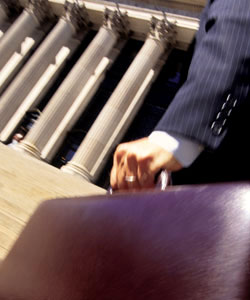 Nov. 1, 2011 – The Wisconsin Supreme Court suggested that state appeals court judges order show cause hearings before imposing fines against attorneys for a perceived failure to comply with rules governing appendix content and certification, in an opinion released today.
Nov. 1, 2011 – The Wisconsin Supreme Court suggested that state appeals court judges order show cause hearings before imposing fines against attorneys for a perceived failure to comply with rules governing appendix content and certification, in an opinion released today.
The opinion, State v. Nielson, 2010AP387-CR (Nov. 1, 2011), loosely addressed the argument that courts violate an attorney’s due process rights if the court imposes monetary sanctions without giving the attorney notice and an opportunity to be heard.
The supreme court, in a unanimous opinion by Chief Justice Shirley Abrahamson, offered a solution:
“[W]e suggest that hereafter when the court of appeals is considering imposing a sanction on an attorney for filing a brief with a deficient appendix, an order should be issued (separate from the court’s opinion on the merits of the appeal) directing counsel to show cause why a violation of the rules governing appendix content and certification, Wis. Stat. § (Rule) 809.19(2)(a) and (b) (2009-10), should not be found and why the attorney should not pay a stated amount of money to the clerk of the court of appeals as a sanction for failing to include in the appendix portions of the record that may have been essential to an understanding of the issue on appeal and for filing an incorrect certification.”
The State Public Defender’s Office (SPD) appealed to the supreme court last year after the District II Wisconsin Court of Appeals imposed a fine of $150 (through summary disposition) against an assistant SPD for a violation of Wis. Stat. section 809.19(2).
Section 809.19(2) states, in pertinent part, that an appellant's brief “shall include a short appendix containing, at a minimum, the findings or opinion of the circuit court, limited portions of the record essential to an understanding of the issues raised, including oral or written rulings or decisions showing the circuit court's reasoning regarding those issues.”
The assistant SPD in the case filed a post-conviction motion for his client, along with an appendix that included a three-page excerpt of the circuit court’s sentencing pronouncement. The attorney certified the sufficiency of the appendix as required by section 809.19(2)(b).
The appeals court ruled, in a footnote to its summary disposition order, that the excerpted portion of the pronouncement provided to the appeals court was insufficient under section 809.19(2), and thus the attorney filed a false certification of sufficiency. The SPD office appealed. The State Bar of Wisconsin’s Appellate Practice Section filed an amicus brief in support of the SPD office’s position.
Interest at stake
Chief Justice Abrahamson noted that while appeals courts have an interest in managing large caseloads through a mechanism to encourage and enforce compliance with the appendix rule, lawyers have an interest in protecting their reputations.
“The significance of counsel’s interests, especially counsel’s reputational interests, makes us wary of the risk, however slight, that an attorney who acts diligently, reasonably, and in good faith might unfairly be labeled a liar,” Chief Justice Abrahamson wrote.
“In an age of instantaneous transmission of information, reputational damage may be inflicted the moment an opinion and order is released that contains an announcement that an attorney has filed a ‘false certification,’” she added.
The supreme court explained that a show cause hearing, issued separately from the opinion on the merits of the case, will better enable appeals court judges to gauge whether an actual violation has occurred and whether a sanction is warranted. “In sum, the order to show cause procedure seems sensible from all vantage points,” the chief justice wrote.
Related
